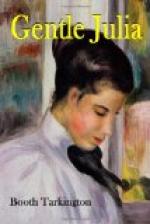Julia looked down with little favour upon the talkative caller. Florence was seated upon the shady steps of the veranda, and Julia, dressed for a walk, occupied a wicker chair above her. “Julia, dressed for a walk”—how scant the words! It was a summer walk that Julia had dressed for: and she was all too dashingly a picture of coolness on a hot day: a brunette in murmurous white, though her little hat was a film of blackest blue, and thus also in belt and parasol she had almost matched the colour of her eyes. Probably no human-made fabric could have come nearer to matching them, though she had once met a great traveller—at least he went far enough in his search for comparisons—who told her that the Czarina of Russia had owned a deep sapphire of precisely the colour, but the Czarina’s was the only sapphire yet discovered that had it. One of Newland Sanders’s longest Poems-to-Julia was entitled “Black Sapphires.”
Julia’s harmonies in black sapphire were uncalled for. If she really had been as kind as she was too often capable of looking, she would have fastened patches over both eyes—one patch would have been useless—and she would have worn flat shoes and patronized a dressmaker with genius enough to misrepresent her. But Julia was not great enough for such generosities: she should have been locked up till she passed sixty; her sufferings deserve no pity.
And yet an attack of the mumps during the winter had brought Julia more sympathy than the epidemic of typhoid fever in the Old Ladies’ Infirmary brought all of the nine old ladies who were under treatment there. Julia was confined to her room for almost a month, during which a florist’s wagon seemed permanent before the house: and a confectioner’s frequently stood beside the florist’s. Young Florence, an immune who had known the mumps in infancy, became an almost constant attendant upon the patient, with the result that the niece contracted an illness briefer than the aunt’s, but more than equalling it in poignancy, caused by the poor child’s economic struggle against waste. Florence’s convalescence took place in her own home without any inquiries whatever from the outer world, but Julia’s was spent in great part at the telephone. Even a poem was repeated to her by the instrument:
How the world blooms anew
To think that you
Can speak again,
Can hear
The words of men
And the dear
Own voice of you.
This was Newland Sanders. He was just out of college, a reviewer, a poet, and once, momentarily, an atheist. It was Newland who was present and said such a remarkable thing when Julia had the accident to her thumb-nail in closing the double doors between the living-room and the library, where her peculiar old father sat reading. “To see you suffer,” Newland said passionately as she nursed her injury:—“to see you in pain, that is the one thing in the universe which I feel beyond all my capacities. Do you know, when you are made to suffer pain, then I feel that there is no God!”




